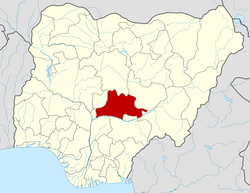| May 2014 Nyanya bombing | |
|---|---|
| Part of the Boko Haram insurgency | |
 | |
| Location | Nyanya, Nasarawa, Nigeria |
| Date | 1 May 2014 8:03 PM (GMT+1) |
| Target | Police checkpoint |
Attack type | Car bomb |
| Deaths | 19 |
| Injured | 60 |
| Perpetrator | Unknown |
On 1 May 2014, a car bomb exploded in New Nyanya, a town in Nasarawa State, Nigeria. The explosion killed at least 19 people and injured at least 60. [1]